Orthopaedic medical negligence claims deal with errors in the diagnosis and treatment of issues with bones, muscles, nerves, and joints. If your doctor misses the signs of an orthopaedic problem or makes an error when operating on you, you may have an orthopaedic negligence claim.
You make an orthopaedic negligence claim when you receive care that is less than what another professional would provide. You may suffer months or years of unnecessary pain and discomfort due to the medical negligence, and you might be able to claim compensation from those responsible.
A No Win No Fee medical negligence solicitor can make your claim for orthopaedic negligence and get you the compensation you deserve.
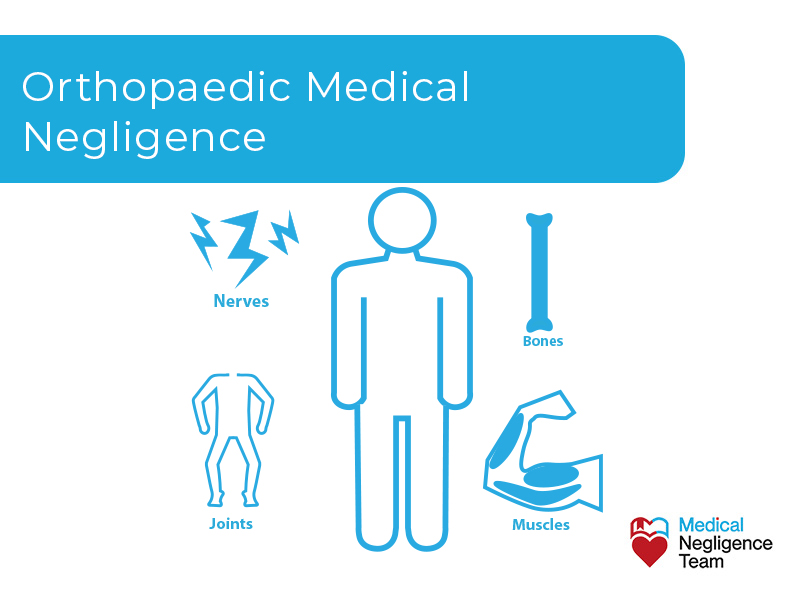
Table of content
What is Orthopaedic Medical Negligence?
Orthopaedic medical negligence is when you receive less than professional care from a doctor or consultant when you have an issue with your bones, joints, muscles, tendons, nerves, and ligaments. The areas of the body affected are the limbs, hands, back and feet.
Medical negligence is medical care below that any other medical professional acting at an acceptable level would provide. With orthopaedic negligence, you could suffer chronic pain or walk with difficulty and may have problems with day-to-day movements of the fingers, toes, and joints.
Any orthopaedic negligence could make a slight bone fracture or tendon strain a lot worse and see a minor issue develop into a condition that lasts many years.
Your No Win No Fee medical negligence solicitor can look at your case and see if you have a valid orthopaedic negligence claim for compensation.
Common Orthopaedic Medical Negligence claims
Common orthopaedic medical negligence claims range from issues with diagnosis in A&E to errors when carrying out routine surgery. You expect care and treatment of a high standard when you visit any medical professional. Not receiving it with something like a broken foot and suffering, as a result, could be clear orthopaedic negligence.
Common orthopaedic medical negligence claims are:
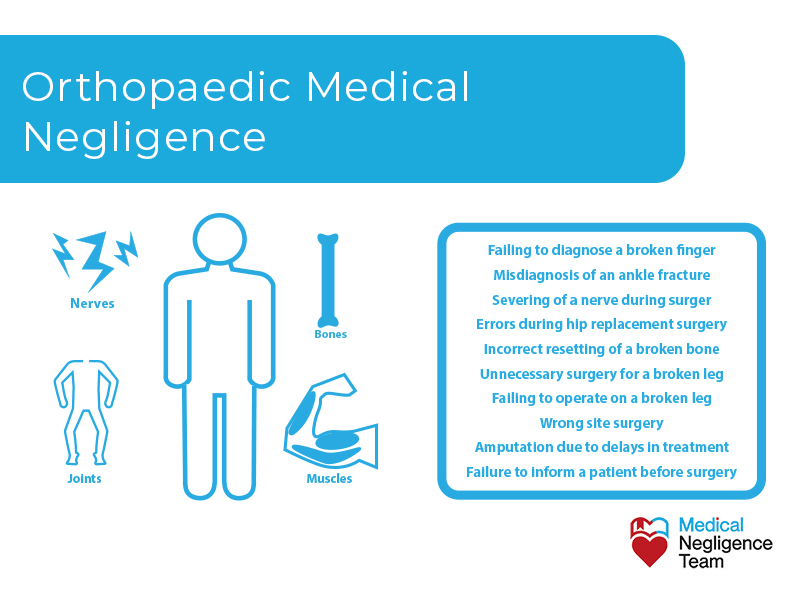
Failing to diagnose a broken finger
Failing to diagnose a broken finger can lead to delays in treatment and the bone setting incorrectly. If you go to A&E with a sore finger after an accident, the doctor should take care to order an X-Ray and do all the correct tests.
To not check for a fracture by ordering further tests could be medical negligence, and you may have a claim for compensation.
Misdiagnosis of an ankle fracture
Misdiagnosis of an ankle fracture can happen with an A&E doctor, a paramedic at the scene of an accident or even at your GP surgery. The doctor should order an X-Ray if unsure of the diagnosis and ensure that the X-Ray is read correctly before making a full diagnosis of the injury.
If the ankle fracture is misdiagnosed as a bad sprain, you could be in pain and risk damaging the joint permanently. When an X-Ray is reviewed there is a recall process if A&E have missed the fracture. If this recall process fails you can be walking around with a fractured ankle when the hospital should have called you back to the fracture clinic. In such scenarios a simple fracture which could have healed with immobilisation may require surgery after becoming what is known as a displaced fracture.
Severing of a nerve during surgery
The severing of a nerve during surgery may happen if the doctor is negligent when operating on your hip, jaw or shoulder injury. The severed nerve is unlikely may be damaged permanently and incapable of repair. This is even worse when the surgeon does not notice at the time.
Your surgeon should take every caution when carrying out bone and joint surgery to avoid severing a nerve and causing serious injury.
Errors during hip replacement surgery
Errors during hip replacement surgery can lead to pain, further surgery and maybe years of unnecessary treatment. If the surgeon inserts the wrong size hip or does not do the replacement surgery correctly, it can lead to many problems.
Surgical standards should ensure a hip replacement surgery is error-free, and you should not have to suffer orthopaedic negligence when a surgeon does the operation wrong, known as a failure of technique, or when the surgeon uses the wrong sized implant.
Incorrect resetting of a broken bone
The incorrect resetting of a broken bone often leads to life-long problems with pain in using a limb, hand, or foot. You undergo surgery to reset the bone, but the surgeon is negligent and, instead of solving the issue, only makes it worse.
You will suffer undue pain and may need multiple surgeries to fix the incorrect resetting of a broken bone.
100% Compensation
If your claim wins we will pay you 100% of the compensation with no deductions. You get 100% every penny with no deductions. New claims only with no previous solicitors.
No Win, No Fee
If your claim wins our costs are paid by the negligent party so you get paid 100% of the compensation recovered.
Our Expert Team
Our Dr Anthony Barton edits the leading book “Clinical Negligence”. Anthony and his wife Penelope (a GP) have a combined sixty years of medical and legal experience.
Unnecessary surgery for a broken leg
In an unnecessary surgery for a broken leg claim, the surgeon opted for surgery instead of going for the simple fix of applying a cast. Undergoing unnecessary surgery can put your health at risk and may delay the correct treatment for a broken bone.
Surgery should not always be the first option when an orthopaedic doctor is looking to reset a broken leg.
Failing to operate on a broken leg
Failing to operate on a broken leg when surgery is necessary can delay the correct treatment and may even cause the broken leg to take longer to heal. If surgery on a fractured leg is necessary, the surgeon should carry out the operation before the bone sets incorrectly.
Surgery is often necessary, and the orthopaedic surgeon should not miss the signs when diagnosing your treatment options.
Wrong site surgery
Wrong site surgery happens in a badly-run operating theatre and in cases where the surgeon fails to read a patient’s notes. By not following protocol, the surgeon may operate on the wrong shoulder or look to reset the wrong leg. Amputating the wrong limb can happen when errors are made during preparation for surgery.
Wrong site surgery should never happen, and NICE guidelines outline how every surgery should proceed and how errors are avoided.
Amputation due to delays in treatment
Amputation due to delays in treatment can happen if infection gets into the bone or joint and causes it to spread into the body. Delays in diagnosis can lead to errors and delays in treatment, which in some cases can lead to the amputation of an arm or leg.
You should never suffer delays in your treatment, and to suffer as a result of a delay is obvious orthopaedic medical negligence.
Failure to inform a patient before surgery
Failure to inform a patient before surgery, such as not telling a patient about the dangers of an operation or the alternative treatments available, should not happen.
The patient should be fully informed of what the surgery will do and if there are any less invasive options to consider.
A patient may not wish to undergo surgery or may wish to opt for an alternative solution to their orthopaedic problems.
Common orthopaedic negligence claims come from errors in diagnosing and treating common orthopaedic injuries and complaints.
Common orthopaedic injuries
Common orthopaedic injuries range from a broken finger to a snapped tendon and torn muscles. You can suffer an orthopaedic injury playing sport, in a road traffic accident or in a simple slip or fall when out walking.
Some common orthopaedic injuries are:
A medical professional should recognise and treat any common orthopaedic injury, and you should not suffer orthopaedic medical negligence.
Your No Win No Fee medical negligence solicitor can take your orthopaedic negligence claim when it happens and seek compensation for your injuries.
Compensation for orthopaedic medical negligence claims
You can seek compensation for orthopaedic medical negligence claims in amounts from the low £10,000s to over £10 million in some cases.
Medical Negligence compensation varies depending on several factors, and orthopaedic negligence claims sometimes see very high awards, such as when misdiagnosis leads to amputation or a lifetime of unnecessary suffering and chronic pain.
Compensation amounts in orthopaedic negligence claims can be:
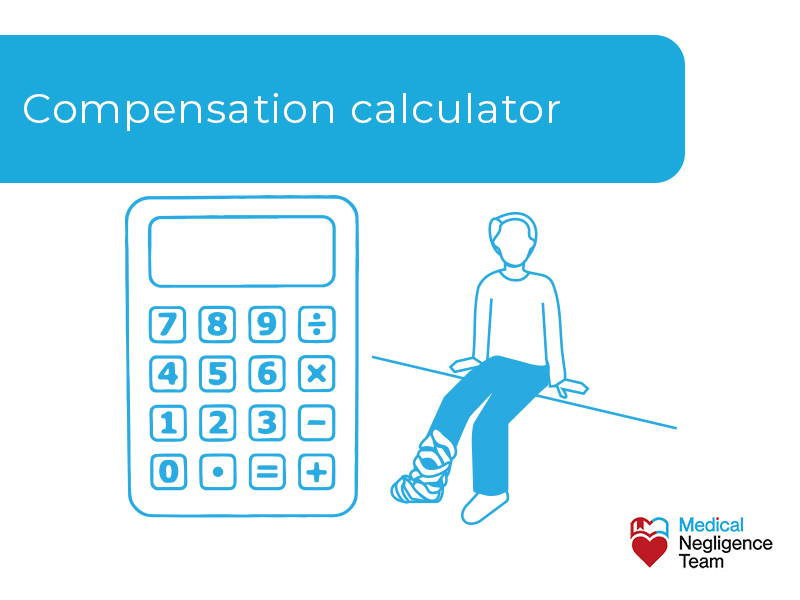
All amounts are approximate and are only a guide to what is possible in orthopaedic negligence claims. Figures can be high in some claims as you or a loved one could need long-term care and may face medical bills for life. You claim for these care expenses and the medical costs in the future.
As in all medical negligence claims, each case is dealt with on merit and how much the patient suffers due to orthopaedic complications.
A No Win No Fee medical negligence solicitor will be the one to advise you on an orthopaedic negligence claim. They will know from experience what your case may be worth and how to make a successful claim.
Your No Win No Fee medical negligence solicitor will handle your orthopaedic negligence claim for compensation and for all damages incurred.
What can you claim for when you sue for orthopaedic negligence?
You can claim compensation for any damages that occurred when you sue for orthopaedic negligence.
There are two types of compensation damages due when suing for any type of medical negligence: General damages and Special damages.
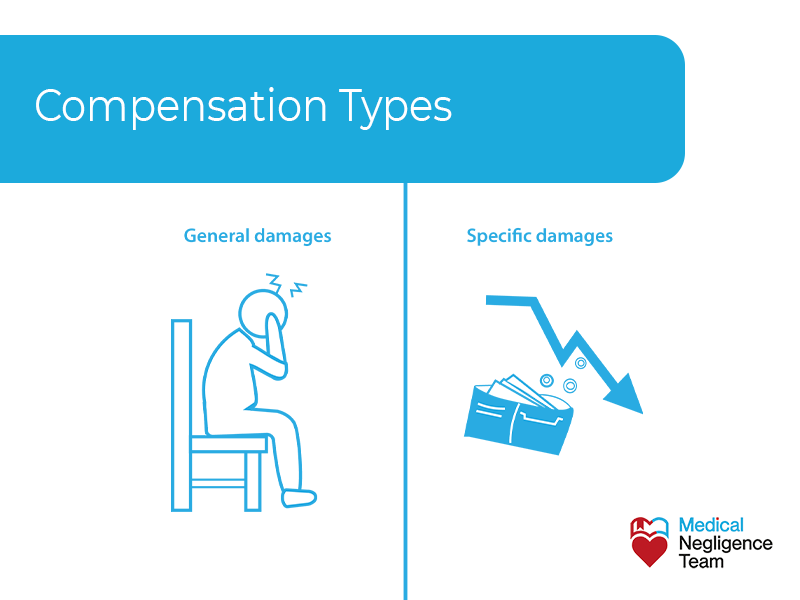
General damages
General damages are when you sue for the pain, suffering and loss of amenity, PSLA, you have experienced due to negligence.
Special damages
Special damages include loss of earnings, future care costs, and out-of-pocket expenses.
Be sure to keep payslips, receipts, and proof of any losses you experience due to the medical negligence.
You deserve compensation to cover all losses, including loss of life, medical costs, and long-term care needs.
When you or a loved one suffers from the effects of orthopaedic negligence, you make a claim for orthopaedic negligence compensation.
Our Process
Our team members have a higher career win rate with a 75% success rate on NHS letters of claim, compared to an industry average of 54.5%.
Enquiry
The first step is to get in touch and tell us what went wrong. It’s free and easy. Call our 24-hour helpline: 0800 246 1122 or request a callback here.
Medical Evaluation
Once you have spoken with our team we’ll let you know how we can help. Typically the next step is to obtain your medical records for us to review.
Legal Letter
Once all your medical records have been received they will be reviewed by a medically & legally qualified member of our team. If there is evidence of negligence we will send a letter of claim to the negligent party outlining your compensation claim.
What are the steps involved in making an orthopaedic negligence claim?
The steps involved in making an orthopaedic negligence claim go from seeking medical advice to issuing court proceedings.
The steps are a part of any successful compensation case, and settlement can happen at any stage in the process.
Your medical negligence solicitor will do the rest when you follow the steps correctly and gather all the facts and figures.
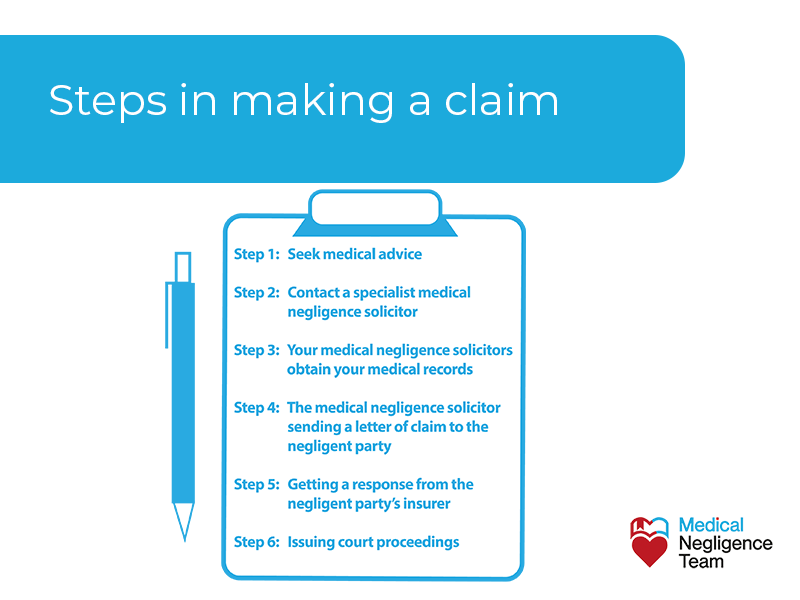
Using a No Win No Fee solicitor
Using a No Win No Fee solicitor is the only way to a successful orthopaedic negligence compensation claim. Your No Win No Fee medical negligence solicitor will not charge you for a claim you do not win.
Always have a fee agreement in place before engaging a medical negligence solicitor. If they start talking of a ‘win fee’ or a ‘success fee,’ you should walk away. The negligent party insurers should pay all fees.
The medical negligence solicitor should also operate a 100% Compensation Guarantee scheme. When you win the case, all the money awarded should go to you, not the solicitor.
You are the one who suffered the orthopaedic negligence, and you deserve the compensation to get your life back to normal.
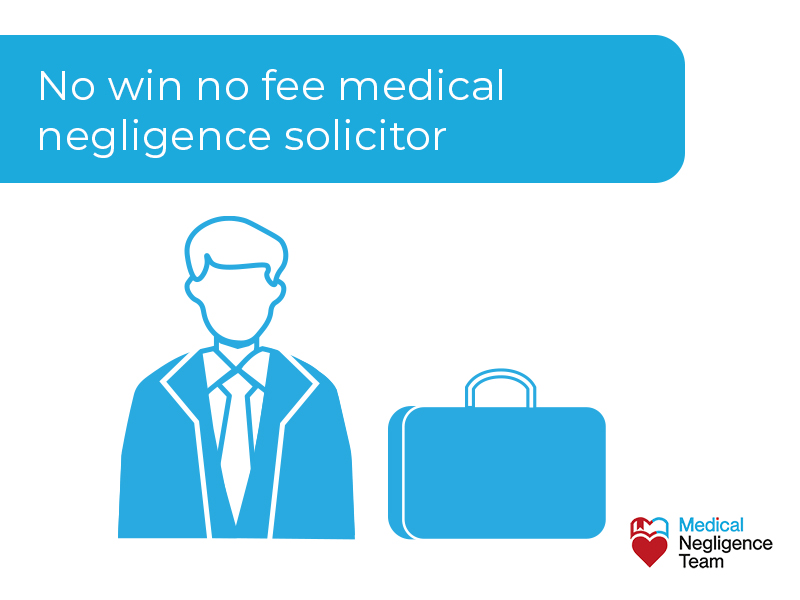
How long do I have to make a claim for orthopaedic negligence?
You have three years to make a claim for orthopaedic negligence. All medical negligence claims are subject to limitation periods.
For example, in England and Wales, medical negligence claims must generally be brought and court proceedings issued within three years of the injury or three years of knowledge of the facts giving rise to the orthopaedic negligence claim.
If someone has passed away, it is the date of death if the limitation period has not expired at the date of death.
Children not under a disability typically have until they reach 21 to start an orthopaedic negligence claim or court proceedings.
Persons with a disability, who lack capacity, are not subject to any limitation period.
Can I make a medical negligence claim against the NHS?
Yes, you can make a medical negligence claim against the NHS. Suing the NHS for negligence is not unusual. People sue the NHS for compensation for medical negligence and receive the money they deserve for the negligent treatment.
There are between 8,000 and 10,000 successful medical negligence claims against the NHS each year—amounts in compensation claims awarded against the NHS range from £1000 to over £10 million.
The amount of compensation you receive covers minor injuries such as scarring to serious life-threatening negligence, which leaves you with long-term care needs.
We trust in and use the NHS daily and do not expect negligence. It happens, though, and the NHS has a dedicated team to handle medical negligence compensation claims, called NHS resolution.
NHS Resolution has a responsibility to treat patients who seek compensation fairly. Patients pay for the NHS through their taxes, and for that they deserve respect and the best medical treatment.
Contact The Medical Negligence Team
Contact the Medical Negligence Team today to discuss your orthopaedic negligence claim for compensation. We have both the legal and medical experts to guide you along the steps to a successful medical negligence claim for compensation.
At the Medical Negligence Team, we fight every compensation claim on a No Win No Fee basis. You will not be out of pocket for an unsuccessful claim.
We have a very high success rate and a reputation for a speedy and successful resolution to all medical negligence cases.
Our 100% Compensation Guarantee puts all the money you win into your pocket. You or your loved one suffered orthopaedic negligence and deserve every penny of the compensation claim.
Contact us at the Medical Negligence Team for all your medical negligence needs.


